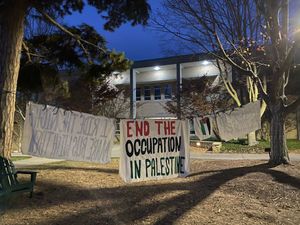On Thursday, July 7, the Asheville Police Department (APD) announced a program to “hand out vouchers worth up to $250 during some traffic stops to motorists who have defective lighting instead of writing a citation.” The program is a partnership with Lights On!, a nonprofit established in the aftermath of Philando Castile’s murder by a Minnesota police officer. While heralded by city leaders as progressive, voucher programs like this are dangerous, and their proponents' use of Philando Castile’s memory is deeply offensive.
Before exploring the negative consequences of this voucher program, it’s important to recognize that it is explicitly “aimed at building goodwill” for a corrupt and incompetent police force. Since 2020, when the heavy-handed response of Asheville police to racial justice protesters became national news, APD has worked closely with Cole Pro Media, a California-based PR firm that helps agencies evade transparency and accountability. We should be extremely skeptical of any program aimed at repairing the relationship between police and the community.
But isn’t it good for police to help motorists instead of punishing them? No—this is where police reformers desperately need an abolitionist lens. As explored in Prison by Any Other Name: The Harmful Consequences of Popular Reforms by Victoria Law and Maya Schenwar, reforms that rely on the police and policing inevitably serve to “widen the net,” sweeping more and more people into the carceral system.
Should motorists with broken tail lights receive vouchers? Yes, they should!
Should those vouchers be delivered by a militarized police force with deep ties to white supremacy and a disposition towards violence against marginalized people? Absolutely not.
Every encounter with a cop is dangerous, especially for poor, Black, and immigrant community members. Since 2017, police have killed nearly 600 people in traffic stops, often while addressing minor infractions like burned-out tail lights. Increasing contact between officers and the public is a threat to public safety, and officers delivering vouchers are almost certain to run tags, request IDs, check for outstanding warrants, and look for evidence of drugs or alcohol in vehicles. As Law and Schenwar explain, police ostensibly acting to provide help often end up ensnaring the “helped” in the criminal punishment system.
"[Philando] Castile was not killed by a citation—he was killed by a police encounter."
The fact that Lights On! traces its origin to the death of Philando Castile during a traffic stop should cause alarm. Castile was not killed by a citation—he was killed by a police encounter. As with the disrespectfully named George Floyd Justice in Policing Act of 2021, the death of Black people is exploited here to justify reforms that strengthen and expand the very institutions responsible. Marcus Kirkman, an Equity and Inclusion Consultant for the City of Asheville, boldly proclaimed that “[these vouchers] are a reminder of the shared humanity and impact we can have on an individual’s life when we extend kindness,” but the announcement suggests that vouchers will be discretionary. In a society where police do not view Black and Brown individuals as having humanity, discretion will result in disparities in who benefits from their kindness. That’s exactly what happened in Minneapolis, where data shows that under the Lights On! program vouchers were issued to white drivers at three times the rate of Black and East African drivers. To reduce the harm caused by police in marginalized communities, we need programs that drastically reduce the power and presence of police themselves.
"In a society where police do not view Black and Brown individuals as having humanity, discretion will result in disparities in who benefits from governmental kindness. That’s exactly what happened in Minneapolis, where data shows that under the Lights On! program, vouchers were issued to white drivers at three times the rate of Black and East African drivers."
Returning to our local context, the final thing that marks this initiative as cynical is its recuperation of the work of Asheville activists who have been offering repairs at no-cost, volunteer-run brake light clinics since 2019. These clinics are informed by abolitionism, with an aim of helping “undocumented residents, people of color, the poor, and the working class avoid time-consuming and even life-threatening consequences.” One of the groups behind the clinics, the Asheville Survival Program (ASP), has been the target of ongoing police surveillance and intimidation, with sixteen of its members currently facing felony charges for sanctuary camp defense. In other words, the City of Asheville is seeking to co-opt the work of grassroots organizers at the same time that it is actively repressing them. Police are key players in both efforts.
We don't need cops with vouchers, we need real alternatives to policing!
Libertie Valance is a worker-owner at Firestorm Books, a 14-year-old cooperative bookstore on Haywood Road in West Asheville.




